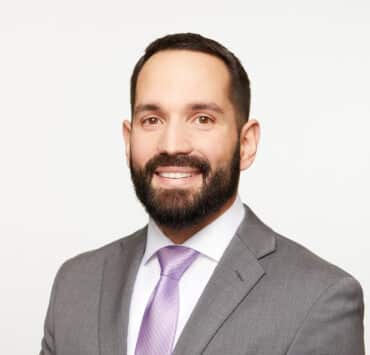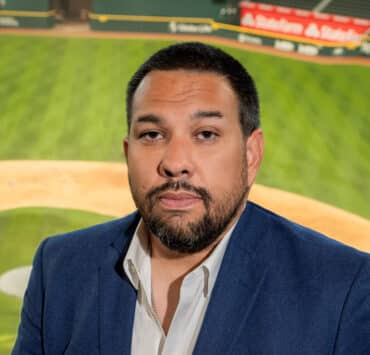|
Getting your Trinity Audio player ready...
|
Often the narrative goes that Latinx parents want their children to be lawyers or doctors. Iliana Limón Romero always knew that her parents wouldn’t mind if she chose journalism instead.
“I was really fortunate that I came from a family and from a background—even though my parents weren’t journalists and they worked in different fields—that they thought [journalism] was a really honorable and noble profession,” says Limón Romero, who is the assistant managing editor for sports at the Los Angeles Times.
Limón Romero’s family had roots in local journalism. Her mother’s great-uncle owned a newspaper in Mexico, and it became the summer field trip destination any time she and her cousins would visit their hometown.
An easy way to entertain the kids for the afternoon ultimately became a core memory for Limón Romero and the seedling for a larger dream. Over the years, she piled up the building blocks for a career of firsts as a reporter. She started by taking on assignments for her high school paper and later at the University of New Mexico.
Before landing an internship at the Albuquerque Journal, she was on the other end of dozens of internship rejections that reminded her of the power of constants that still exist in her life today—community, holding the door open for others, and trusting that hard work does pay off.
“At the time, there was a stigma against people going into sports and then having any other career options within journalism. Could you go back to news? Could you be a newsroom leadership? Would you be taken seriously?”
Iliana Limón Romero
“I got turned down for forty-five internships—all of them, every single one,” Limón Romero says. “I got a rejection letter from the New York Times and didn’t even apply for their internship. I think they got my portfolio handed off to them [at the National Association of Hispanic Journalist Convention] somehow. And I was like, how do you get a rejection letter from somewhere you didn’t even apply? This is crazy and not super encouraging, but I was very fortunate. I had some really great professors and advisors who were distinguished retired journalists who were very, very encouraging and said, ‘you know, it’s OK.’”
They were right, and it was OK because once she got through the door, Limón Romero held onto her curiosity and determination to make it all OK for herself and others.
“I grew up on the border, and the work ethic and the attitude from my family was, ‘If you’re willing to work and if you’re willing to try, you can accomplish these goals,’” the editor says. “And it might not be easy, it may not come right away, but your determination will be rewarded in many ways. You just have to keep focused and keep going. And, if you love it and you believe in it, then sometimes it’s not always easy, but that you can get there.’”
In her current Los Angeles Times role, she is the first woman, first Mexican American, and first Latina to hold the role. Before this, she was the sports editor at the Orlando Sentinel, where she was also the first Latina sports editor to hold this role. At the start of her career, the now forty-two-year-old Limón Romero was a news reporter. Her transition from the news to the sports section came after answering some important questions, both with herself and prompted by others.

Keeping Doors Open
When the opportunity arose to take on a role covering sports, Limón Romero turned to one of the members of her community, a fellow reporter who had transitioned from sports to arts.
“At the time, there was a stigma against people going into sports and then having any other career options within journalism. Could you go back to news? Could you be a newsroom leadership? Would you be taken seriously?” Limón Romero says. “And a lot of people said, ‘No, that wouldn’t be the case.’ They have since been proven wrong because if you look at a lot of senior leadership across major publications, many of them have very diverse backgrounds, and a lot of them have come from sports because there’s a lot of innovative thinking and deadline-oriented decision-making that has to come from that space.”
The fellow reporter’s answer? “‘It’s wide open. It’s whatever you want to do.’”
“It was really encouraging to have that conversation right in that moment,” Limón Romero says.
The encounter is one of many illustrating how Limón Romero has pursued keeping lines of communication open for herself and her community.
Limón Romero is now president of the Association for Women in Sports Media and cochair of the National Association of Hispanic Journalists Sports Task Force. She holds these two organizations close to her heart and dedicates time and energy to continue to build them because of not only what they have done for her but also what she knows they can also do for others.
“Everything that I’ve pursued in my career, no doors have closed behind me,” the editor says. “I’ve had confidence that I could always redirect and choose a different path, that it wasn’t necessarily something that I was turning down, that I would always have more opportunities.”
The First but Not the Last
Limón Romero has paved new paths forward for herself and others in every newsroom she’s stepped foot in. With each new accolade, she’s committed to ensuring that she is not the last to be given the opportunity, space, or assignment needed to succeed.
“Although I support lots of endeavors of the overall organization, for me it is about providing support, mentorship, and opportunities for Latinos in media in all areas of media,” she says. “I have a particular interest in sports, but I’m very open to helping people from across all backgrounds. A lot of people opened the doors for me, had conversations with me, gave me guidance, acknowledged that I existed, and said, ‘keep going.’ I was able to absorb lots of early rejection because I’d had [their] encouragement.”
While Limón Romero is a mentor to many and leads her team of thirty with a balance of kindness and rigor, she also believes that media organizations have the power to impact at scale. Her involvement in these two organizations, and in the way she leads her team, brings her full circle every day to her own family’s ethos that hard work and a supportive network make a difference.
“Making sure that we’re putting people in positions to be successful, to get in the door, to thrive once they’re there, and to move forward is really important to me because so many people opened up those opportunities for me,” she says. “Our industry is going to be less and relevant if we’re not able to have those conversations at that level . . . [US demographics], quite frankly, are going in such a direction that it’s no longer going to be economically viable for those who blew off the needs to have a diverse staff that represents the community they’re covering.”
“I really encourage people [to] collect peers, collect mentors, collect allies and different people who can help you for different needs in your life.”
Iliana Limón Romero
Community Should Be a Constant
One of the top pieces of advice Limón Romero offers is to connect with like-minded peers without an agenda.
“The best thing about [professional organizations] and finding those peers who are in that level, or people who are older than you is that they generally listen to you and have your best interests at heart,” she says. “They’re not thinking in terms of the company, they’re not thinking in terms of how it impacts them when they’re trying to give you advice. It’s entirely based on concern for you and how this impacts you and how they can help you. That’s very meaningful.”
Limón Romero also adds that similar to how it takes a village to raise a child, it takes more than one mentor to support you throughout your career.
“People are looking for their mentor, and that’s great if you have someone who’s your go-to person, but I think we have to be realistic about life and work responsibilities that other people have,” she advises. “If you’re relying on just one person to give you that lift that you need, it’s possible that they’re just not able to do it during certain times or maybe they’re not the perfect fit because their skill set is in [a different] area. I really encourage people [to] collect peers, collect mentors, collect allies and different people who can help you for different needs in your life.”

